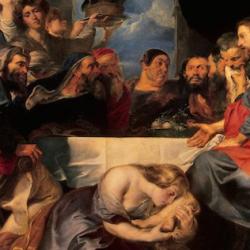Sermon notes for September 21:
A Great Prophet, Luke 7:1-50
INTRODUCTION
The previous section of Luke’s gospel (5:1-6:11) began with a call to disciples and ended with the Pharisees seeking ways to destroy Jesus. This section (6:12-7:50) begins with the appointment of apostles and ends with all the people in the Pharisee’s house questioning Jesus’ right to forgive sins.
In chapter 7, the focus of attention is the authority of Jesus’ words. Jesus closes His sermon in chapter 6 with a warning to those who hear and do not obey His word (6:46-49). Jesus’ word is the “word of God” (5:1), and carries the same authority as any word of God. In the incidents in chapter 7, Jesus’ word is again a central focus, and the question of His “prophetic” status is repeatedly raised: His word has authority over fevers (7:1-10) and death (7:11-17), and Simon the Pharisee wonders if Jesus is a prophet (7:39). Over and over Jesus has proven Himself a prophet, but the Pharisees are still questioning Him.
THE TEXT
“Now when He concluded all His sayings in the hearing of the people, He entered Capernaum. And a certain centurion’s servant, who was dear to him, was sick and ready to die . . . .” (Luke 7:1-50).
FAITH OF GENTILES
Though Jesus heals a centurion’s slave in the first incident, the focus is really on the centurion himself. Apparently stationed in Capernaum, this Gentile centurion had been attracted to Judaism and had helped the Jews build the local synagogue (7:4-5). He also carefully observes Jewish scruples, sending Jewish leaders to contact Jesus and asking Jesus not to come into his home. The Jews therefore consider him “worthy” of Jesus’ attention, Gentile though he is.
The centurion’s commitment to the God of Israel is far deeper than even the Jews recognize. He recognizes his own “unworthiness” (7:6-7) before Jesus, and he recognizes that Jesus has authority to heal his slave even from a great distance. The Jewish elders recognize neither; they believe he is worthy, and that Jesus has to be physically present to heal the slave. Just as the centurion causes his soldiers to do things by a word, so Jesus can heal by a word (7:8). The centurion recognizes that Jesus is a commander, the Lord of armies. Jesus, whose mighty deeds have astonished crowds, is Himself astonished at the centurion’s confidence in Him. The centurion is the firstfruits of the Gentiles.
A SON RAISED
Jesus’ word has power not only to heal, but to raise the dead (7:11-17, esp. v. 14). As he comes to the village of Nain, a funeral procession is leaving the city gate. Luke seldom tells us anything about Jesus’ emotions, but here he tells us that Jesus was filled with compassion for the mother who had lost her only son (v. 13). Under the law, touching a coffin communicated a particularly intense form of uncleanness (cf. Numbers 19). Instead of becoming unclean and ceremonially dead, Jesus communicates life to the young man.
The people are reminded of the miracles of Elijah and Elisha (1 Kings 17:17-24 [esp. v. 23]; 2 Kings 4:18-37), and rejoice that “a great prophet has arisen among us,” bringing in a new exodus, a “visitation” of Israel (v. 16; cf. Acts 7:23). Like Elisha, Jesus helps a Gentile soldier; like Elijah, He raises a widow’s son from the dead.
JOHN AND JUSTIFYING GOD
In the context of these powerful displays, John wonders whether Jesus is in fact the “Coming One” that John had prophesied (3:15-17). He has reason to ask. After all, John had predicted the coming of a judge who would sift Israel and cut down the corrupt trees from the forest, and yet here is Jesus healing and raising the dead and casting out demons. John wonders, Where’s the fire from heaven? Jesus’ response is to cite a series of passages from Isaiah that describe the character of the day of salvation (Isaiah 29:17-22; 35:5; 61:1). Jesus’ humility, the fact that He puts Himself at the service of Israel rather than immediately standing in judgment over her, is a stumbling block for Jews who are looking for fireworks (cf. Jonah). What is surprising about Jesus, what is surprising about God, is His longsuffering, patience, and mercy toward hardened people.
Jesus then turns to the crowds to ask them what they expected from John. When the tax gatherers hear Jesus’ endorsement of John’s ministry, they “justified God” (v. 29), that is, they acknowledged that God was just. By accepting John’s baptism, they were confessing that they deserved to be judged. They acknowledged that God’s verdict over them was correct. The Pharisees and teachers of the law, however, do not honor God’s justice; and, by not justifying God, they are not justified. They condemn Jesus just as severely as they condemned John.
THE WOMAN AND THE PHARISEE
Again we see Jesus at a meal, this time with a Pharisee. Jesus is truly catholic in his table fellowship: He is so open that He even eats with Pharisees. As was customary, Jesus reclines at the table, with his head facing toward the center, where the food is served. The woman stands “behind” him at his feet and begins to anoint him (v. 38). Her position “at his feet” shows that she has become Jesus’ disciple.
The focus of this incident is, first, on the contrast between the Pharisee’s evaluation of the woman and Jesus’ evaluation of her. The Pharisee condemns her as a “sinner” (v. 39). Jesus does not deny that she has sinned, but characterizes her as a forgiven sinner, who shows unrestrained love for Jesus because she has been forgiven much. He catches Simon with His parable and questions, and forces Simon to admit that the woman’s actions are a result of her having been forgiven much (vv. 40-43).
Second, this incident focuses on contrasting evaluations of Jesus. Simon the Pharisee doubts that Jesus can be a prophet, since He doesn’t appear to know that the woman is a sinner (v. 39). Jesus knows what he’s thinking, though, which proves He is a prophet (vv. 39-40). His reception of Jesus, furthermore, was minimal; he did not give Jesus the kind of hospitality that would be given to a truly honored guest. The woman, however, has made up for it, mimicking the customs of hospitality by washing Jesus’ feet with her tears, kissing his feet, and anointing his feet with perfume. A woman, and a sinful one, responds to Jesus more discerningly than the well-educated Pharisee, just as a Gentile centurion knows the God of Israel better than the Jews. The new Israel, the one clustering around Jesus, is going to be a new Israel indeed.















